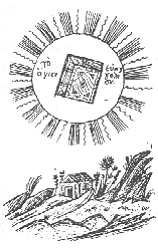Acquiring an Orthodox Mindset: How to Read the Holy Fathers

This section highlights articles dealing with how we—given our modern, rationalistic, and skeptical mindsets—should approach the writings of the Fathers, especially the Lives of Saints. The main concern of the authors below is to prepare the reader to approach the Fathers with an Orthodox orientation, employing "secondary theology" with a view towards leading the reader to the path of ascetic struggle and (at least) a humble recognition of the spiritual authority of "essential theology." Little will be said about an academic approach that has as its goal the "gleaning of facts" or the intellectual comprehension of dogmatic theological issues.* As Father Seraphim noted in Vita Patrum: The Life of the Fathers, "The purpose of the Lives of the saints is not to give abstract knowledge but, as St. Gregory often states in his works, to edify spiritually and to inspire to imitation" (p. 31).
Aside from the articles listed below—most of which are by Father Seraphim, one of the most important twentieth-century "trail blazers" to the path of the Fathers—there are two books that are absolutely indispensable for anyone interested in developing an Orthodox phronema (listed in order of suggested reading): Vita Patrum: The Life of the Fathers, by Saint Gregory of Tours and Blessed Paisius Velichkovsky: The Man Behind the Philokalia, by Schema-monk Metrophanes. Both of these profound works were translated by Father Seraphim and are still in print.
* For these tasks—which, we should add, certainly have their place—there are a few good books available to help introduce and guide a person through the patristic corpus of writings. Two of the best are Beginning to Read the Fathers, by Boniface Ramsey, O.P. (Paulist Press, 1985) and Eastern Patristic Thought and Orthodox Theology, by Constantine Tsirpanlis (Collegeville MN: The Liturgical Press, 1991). It is also worth noting that the proper understanding of Orthodox dogma is not something that should be relegated to only the clergy or "professional theologians." Rather, as Metropolitan Ierotheos (Vlachos) points out, in Orthodoxy "dogmas are referred to as such, because they draw the boundaries between truth and error, between sickness and health. Dogmas express the revealed truth. They formulate the life of the Church. Thus they are, on the one hand, the expression of Revelation and on the other act as 'remedies' in order to lead us to communion with God, to our reason for being... Theology is the fruit of man's cure and the path which leads to cure and the acquisition of the knowledge of God." Thus, the divine dogmas are not mere intellectual truth propositions catering to rationalism, but are medicine for the soul. For more information on his outstanding patristic writings...
How to Study and Communicate the Words of the Fathers, by Archimandrite Vasileios.
Guidance for Laymen on Reading Spiritual Books. From the Letters of Archbishop Theophan of Poltava and Pereyaslavka.
The Holy Fathers of Orthodox Spirituality (Part 1 of 3): "The Inspiration and Sure Guide to True Christianity Today," by Fr. Seraphim Rose of Platina.
The Holy Fathers of Orthodox Spirituality (Part 2 of 3), "How to Read the Holy Fathers," by Fr. Seraphim (Rose) of Platina.
The Holy Fathers of Orthodox Spirituality (Part 3 of 3), "How Not to Read the Holy Fathers," by Fr. Seraphim Rose of Platina.
Reading the Fathers, from a sermon by Archbishop Chrysostomos of Etna (Orthodox Tradition, Vol. VI, No. 3).
Meta-Patristic Theology: Are the Fathers Relevant Today?, by Monk Moses the Hagiorite.
A Sermon on Reading Spiritual Works, by Archbishop Platon of Kostroma.
How Not to Read the Fathers, by Archbishop Chrysostomos (Orthodox Tradition, Vol. XIII, No. 2).
Raising the Mind, Warming the Heart, by Fr. Seraphim Rose of Platina.
Excerpts from The Arena on Reading Spiritual Books, by St. Ignaty (Brianchaninov). Two short and helpful chapters.
"It may readily be seen how foreign such readings are to the spirit and taste of our times. These are what might be called by some modern scholars 'pious tales' or 'miracle stories'; he would disdain them not only for their miracles, but just as much for their 'moralizing.' But it is just here that the searcher for the true spirit of Orthodoxy must question the 'objective' scholar."
—From Father Seraphim's "Prologue" to Vita Patrum: The Life of the Fathers, by Saint Gregory of Tours, p. 17.
But for the searching and right understanding of the Scriptures there is need of a good life and a pure soul, and for Christian virtue to guide the mind to grasp, so far as human nature can, the truth concerning God the Word. One cannot possibly understand the teaching of the Saints unless one has a pure mind and is trying to imitate their life. Anyone who wants to look at sunlight naturally wipes his eye clear first, in order to make, at any rate, some approximation to the purity of that on which he looks; and a person wishing to see a city or country goes to the place in order to do so. Similarly, anyone who wishes to understand the mind of the sacred writers must first cleanse his own life, and approach the Saints by copying their deeds. Thus united to them in the fellowship of life, he will both understand the things revealed to them by God and, thenceforth escaping the peril that threatens sinners in the judgment, will receive that which is laid up for the Saints in the Kingdom of Heaven.
—St. Athanasius, On the Incarnation of the Word of God, 57.

